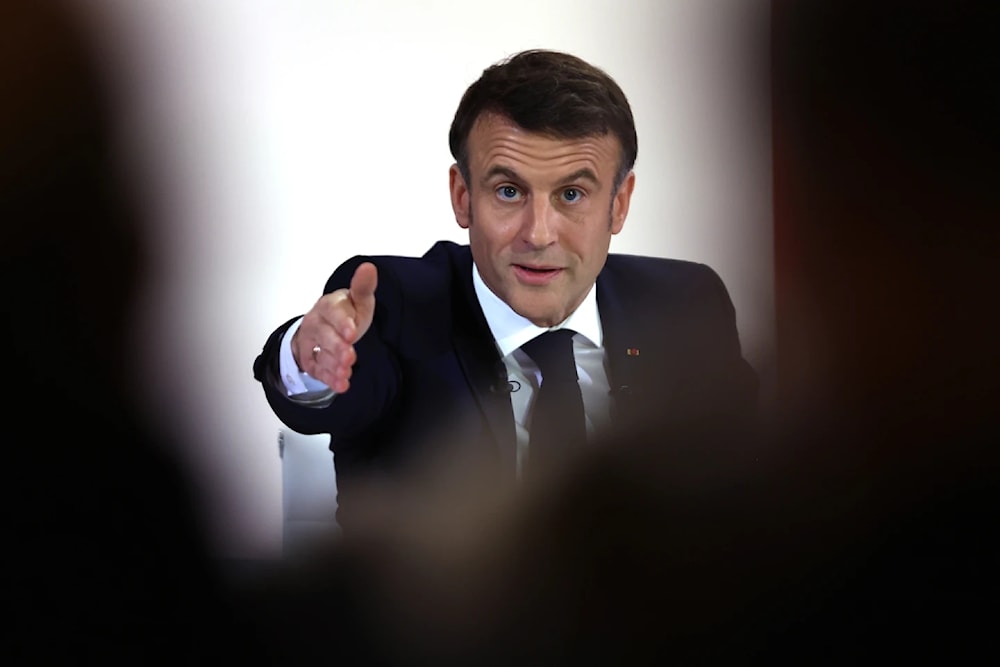Macron to host Syrian president al-Sharaa's first European visit
French President Emmanuel Macron will meet Syria’s interim leader Ahmad al-Sharaa to push for regional stability, inclusive governance, and "anti-terror" efforts.
-

French President Emmanuel Macron gestures during his first news conference to announce his top priorities for the year, January 16, 2024, at the Elysee Palace in Paris. (AP/Aurelien Morissard)
French President Emmanuel Macron will host Syria’s interim President Ahmad al-Sharaa on Wednesday in Paris, marking the former Islamist militant’s first official visit to Europe, the Elysee Palace confirmed to Agence-France Presse (AFP).
The meeting signals France’s attempt to re-engage with Syria following the overthrow of longtime ruler Bashar al-Assad late last year.
According to the French presidency, Macron will "reiterate France's support for the construction of a new Syria, a free, stable, sovereign Syria that respects all components of Syrian society."
“This meeting is part of France's historic commitment to the Syrian people who aspire to peace and democracy,” the statement added.
During the visit, Macron will underline his government's priorities regarding the Syrian interim government, with a particular focus on regional stability, especially in Lebanon, and counter-terrorism, the presidency indicated.
The invitation was first extended in February shortly after al-Assad’s fall, and renewed in March under the condition that the new Syrian leadership form an inclusive government. At the time, Macron described early discussions with Syrian officials as “positive.”
On April 25, al-Sharaa had expressed willingness to consider joining the US-brokered normalization with "Israel" deals, marking a significant shift in Syria-"Israel" relations, according to US Representative Marlin Stutzman (R-Ind.), who met with the Syrian leader during a visit to Damascus.
Syria’s new Islamist-led authorities, some of whom have historical ties to the al-Qaeda network, with al-Sharaa himself once pledging his allegiance to Abu Baker Al Baghdadi, the ISIS founder, have publicly committed to inclusive governance in the country’s multi-ethnic and multi-confessional landscape.
They have also promised to safeguard religious minorities and broaden political participation, though international skepticism remains high.
Syria's new rulers pledge inclusivity despite violence
Despite repeated pledges of inclusivity from the Syrian interim government, ongoing sectarian clashes have drawn global condemnation. In March, violence in the coastal regions of Tartus and Latakia left over 1,700 dead, mostly from the minority Alawite community, prompting widespread condemnation.
The violence had even spread to the point where the widely cited Syrian Observatory of Human Rights (SOHR) had said that the massacres amounted to "systematic genocide".
Tensions have continued, with recent armed confrontations involving Druze fighters and reports of abuses documented by several NGOs. These developments have raised concerns about the interim authorities’ ability to curb extremist factions within their own ranks.
Western governments, while cautiously optimistic, have indicated that Syrian sanctions relief will depend on the new government’s behavior, position on "Israel" and commitment to civil rights protections.
On April 24, US Congressman Cory Mills held a controversial meeting in Damascus with al-Sharaa, Syria’s interim President and ex-al-Qaeda figure, during an unofficial “fact-finding mission”, Bloomberg reported.
Mills, a Trump ally, pledged to deliver a letter from al-Sharaa to Trump and discussed lifting US sanctions in exchange for Syria's possible entry into the Abraham Accords. Critics see the meeting as a backchannel effort to align Syria with US-Israeli interests at the expense of regional sovereignty.
Israeli strikes escalate tensions
The situation has been further complicated by continued Israeli airstrikes across Syrian territory. Since the fall of al-Assad, “Israel” has carried out hundreds of attacks, including one near the presidential palace in Damascus on Friday.
“Israel” has claimed these strikes are meant to deter threats and protect the Druze minority, calling the most recent strike a “clear message” to the country’s new leadership. In response, the interim Syrian government labeled the incident a “dangerous escalation.”
The United Nations responded to the strike with a warning on Saturday, urging “Israel” to cease all military attacks on Syria “at once”.
One of the reported strikes over the last few days targeted the area near the village of Shaṭḥa in western Hama countryside, where a military warehouse located within what is being described as a Syrian army base of the former regime was hit. Simultaneously, Israeli aircraft were heard over multiple governorates, signaling the broad scale of the recent attacks.

 4 Min Read
4 Min Read








